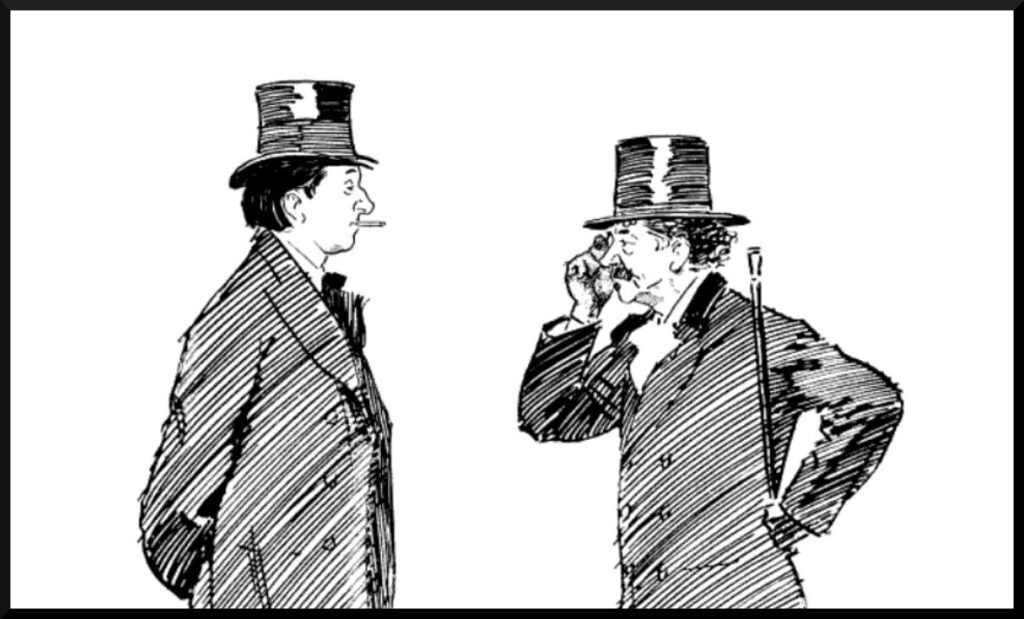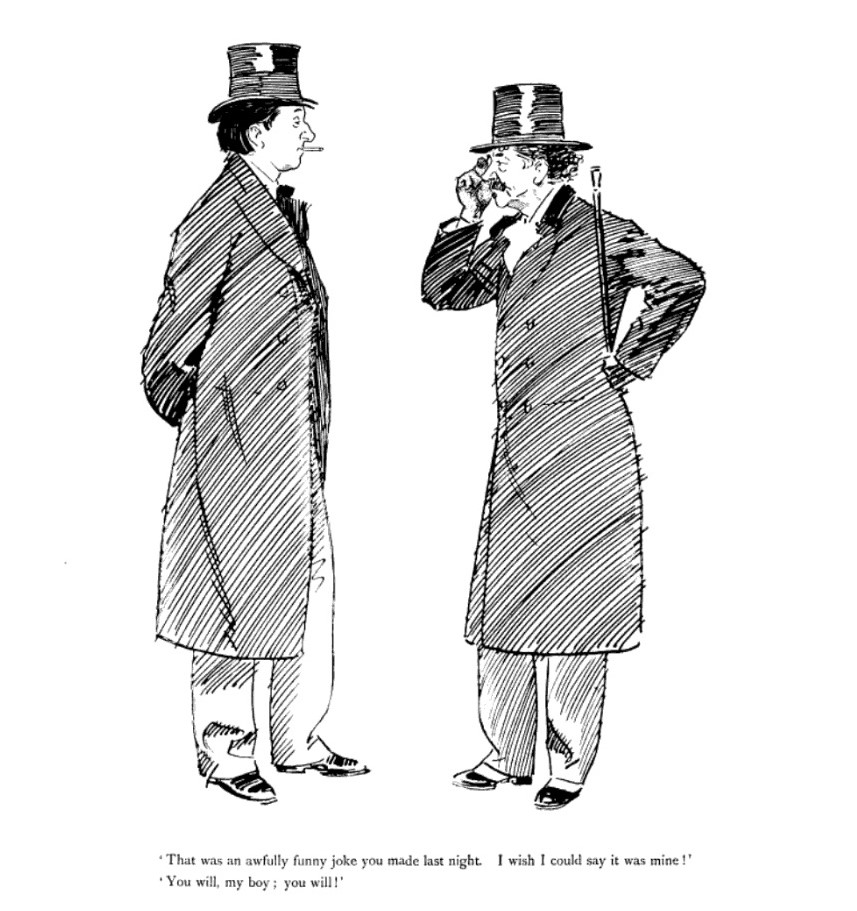Oscar Wilde? James McNeill Whistler? Apocryphal?

Question for Quote Investigator: I would like to learn more about a famous anecdote involving James McNeill Whistler, the painter who is known for his iconic portrait of his mother. Apparently, Whistler was able to trump Oscar Wilde, one of the greatest wits of the nineteenth century who was occasionally accused of appropriating the clever expressions spoken by others.
During a party Whistler made a humorous remark and the following statements were exchanged:
Oscar Wilde: I wish I had said that.
James McNeill Whistler: You will, Oscar, you will.
The accounts of this story I have read were written after the death of Oscar Wilde in 1900. Do earlier reports exist? Also, what was the quip that inspired Wilde’s compliment?
Reply from Quote Investigator: The earliest evidence known to QI was published in January 1886 in “The Sunday Herald” of Boston, Massachusetts. James McNeill Whistler was planning to visit the United States and conduct a lecture tour. William M. Chase, a friend of Whistler’s, was asked about the content of the forthcoming lectures and responded with caustic words about Oscar Wilde. The article included a version of the anecdote. Boldface has been added to excerpts:1
“Was his talk on art similar in any respect to Mr. Wilde’s?”
“Well, as Oscar Wilde cribbed from Whistler almost everything he said in his lecture here about art that was worth saying, there may be some remote resemblance between the two lectures as to their matter, but that is certainly all.”
Whistler pricked this bubble of Wilde very neatly and epigrammatically at a Paris salon last season presided over by a well known and popular lady. Whistler had been notably witty during the evening and finally made a bon mot more than usually pointed and happy that convulsed his listeners.
Wilde, who was present, approved Mr. Whistler’s brightness, and wondered why he had not thought of the witticism himself. ‘You will,’ promptly replied Whistler, ‘you will.’ This lightning comment on Mr. Wilde’s wonderful ability to think of other people’s bright things and to repeat them as his own had, you may imagine, an immediate and most discomforting effect on Mr. Wilde.
Thanks to top researcher Stephen Goranson who located the above citation.
In May 1886 a version of the Wilde and Whistler anecdote was printed in a Wichita, Kansas newspaper. This instance was very similar to one given in “The Sunday Herald” above. The text was extracted from the longer article and slightly condensed.2
The next earliest evidence known to QI was printed in the “Jamestown Weekly Alert” of the Dakota Territory in February 1887.3 The same story was reprinted in “Frank Leslie’s Popular Monthly” in May 1887:4
A Boston artist tells this story of Whistler and Oscar Wilde, who has the reputation of borrowing Whistler’s bright speeches. Having heard the artist say an unusually good thing Oscar exclaimed, deploringly: “I wish I could have said that.” “Oh,” replied Whistler derisively, “but you know you will say it.”
This short description did not specify the comment initially made by Whistler, and most early descriptions were similarly incomplete. The precise phrasing of Whistler’s rejoinder was variable. Intriguing versions of the tale were published years later; in 1913 Douglas Sladen published an instance and claimed that he was present when the words were spoken. Sladen stated that the witticism that inspired Wilde’s initial compliment was spoken by a “pretty woman”. In 1946 a biographer named Hesketh Pearson presented another interesting example of the anecdote. The details of these cites are given further below.
Here are selected citations in chronological order.
In a letter dated September 1889 a writer named George W. Smalley described the imposing character of James Whistler and mentioned the well-known exchange with Wilde:5
Nobody is so explosive, or fills the room so entirely full of his own talk, or disposes more decisively of an intruding opponent, or turns on him more suddenly. A clever phrase once drew from a bystander the response, “I wish I had said that.” Mr. Whistler’s retort came like lightning, “You will say it, Oscar, you will.”
In November 1889 a periodical called “The Theatre” presented the tale together with another remark by Whistler:6
Whistler, the eccentric artist that scampers mid-street after auburn-topped models, and that works in blue and silver now and then, is one of the wittiest men in London. At a dinner, the other evening, when Whistler was being applauded for some witty remark that he had let fly, Oscar Wilde, who lives on the bright sayings of others, drawled: “How-I-wish-I-had-said-it!” Whistler turning toward him, exclaimed: “Ah! but you will say it, don’t you know.”
Another time, when one of those absinthe-loaded chappies called on Whistler to tell him that “he and Velasquez were the only artists that ever lived,” Whistler replied to his flatterer with: “Why drag in Velasquez—eh?”
In April 1890 the New York Times printed the story while noting that Whistler and Wilde were once friends:7
It is certain, at any rate, that they were once very intimate, and we have all heard the anecdote of Whistler telling a good thing in Wilde’s presence when the latter exclaimed: “Heavens! I wish I had said that!” “You will,” was the lightning answer of Whistler.
In 1895 “Phil May’s Sketch-Book” included an illustration of two men who looked similar to Wilde and Whistler. The conversation between them was presented in the following caption:8
‘That was an awfully funny joke you made last night. I wish I could say it was mine!’
‘You will, my boy; you will!’

In 1896 McClure’s Magazine published a profile titled “Whistler, Painter and Comedian” in which the author asserted Whistler had carefully prepared for the delivery of his caustic witticism:9
It is impossible to be in Mr. Whistler’s society long without hearing him talk of “getting off” amazing or astounding things, by which he means epigrams. He will spare no pains to get off a good one, and will lead up to it with the most painstaking ingenuity, so that it may at last be jerked out in a natural way. His best-known mot—when Oscar Wilde said to him, “I wish I had said that, Jimmy;” and he said, “Oscar, you will;”—was the result of days of preparation, and was carefully treasured up until the right moment came to “get it off.”
In 1913 “Twenty Years of My Life” by Douglas Sladen was released, and Sladen wrote that he had directly observed the famous incident:10
I remember Whistler the painter and Oscar Wilde being the first two people to arrive at a reception at Mrs. Jopling’s house in Beaufort Street, where I had been lunching.
Wilde made a statement that was critical of Whistler that involved traveling a route through Dieppe. Whistler’s later acerbic remark was a form of retaliation according to the author. Sladen’s version of this story was distinctive because he credited an anonymous woman with making the preliminary comment:
It was at this at-home later on that Whistler made his often-quoted mot—not for the first time, I believe. A pretty woman said something clever, and Wilde, who could be a courtier, gallantly remarked that he wished he had said it.
“Never mind, Oscar,” said Whistler, who owed him one for the gibe about the Dieppe route; “you will have said it.”
In 1946 the biography “Oscar Wilde: His Life and Wit” by Hesketh Pearson was published, and Pearson presented an engaging account that included a preliminary remark from Whistler:11
Humphry Ward, art critic of The Times, was at an exhibition of Whistler’s paintings, expressing his opinion that one work was good, another bad, and so on.
“My dear fellow,” said Whistler, “you must never say this painting is good or that bad. Good and bad are not terms to be used by you. But you may say ‘I like this’ or ‘I don’t like that,’ and you will be within your rights. Now come and have a whisky: you’re sure to like that.”
“I wish I had said that!” exclaimed Wilde delightedly.
“You will, Oscar, you will,” retorted Whistler with his loud “Ha-ha!”And there is not the least doubt that Wilde laughed louder than anyone else at this sally, as he usually did when the joke was a good one against himself.
In conclusion, QI believes that James McNeill Whistler did trump Oscar Wilde with a witticism. The exact phrasing of Whistler’s remark is uncertain, but the semantics accords with “You will, Oscar, you will.”
The comment that inspired Wilde’s initial compliment might be the one given in the 1946 citation, but QI thinks it probably has been lost.
Image Notes: Depiction of Wilde and Whistler from “Phil May’s Sketch-Book” in 1895. The image at the beginning of the article is cropped and resized.
Acknowledgement: Many thanks to Stephen Goranson who found the important citations in January and May 1886. Great thanks to Hugo who found the valuable citation in February 1887. Special thanks to G. who asked about this example of repartee. Further thanks to Geoffrey Matthews who identified the 1895 cartoon, and thanks to Nigel Rees who shared the cartoon discovery in his “Quote…Unquote” Newsletter of April 2024.
Update History: On October 15, 2013 the citations dated January 24, 1886; May 12, 1886; and February 10, 1887 were added. On March 30, 2024 the citation and illustration from 1895 was added to the article. On January 27, 2025 the format of the bibliographical notes was updated.
- 1886 January 24, The Sunday Herald (Boston Herald), J. M’Neill Whistler: The London Artist Coming to America to Lecture, Quote Page 14, Column 7, Boston, Massachusetts. (The spelling “epigramatically” in the original text was replaced by “epigrammatically”) (America’s Historical Newspapers, Readex, NewsBank) ↩︎
- 1886 May 12, Wichita Daily Eagle, Wit and Humor: Mr. Whistler and Oscar Wilde, (Acknowledgement to The Argonaut), Quote Page 4, Column 2, Wichita, Kansas. (Chronicling America) ↩︎
- 1887 February 10, Jamestown Weekly Alert, Whistler and Wilde, Quote Page 5, Column 2, Jamestown, Dakota Territory (later North Dakota) (Chronicling America) ↩︎
- May 1887, Frank Leslie’s Popular Monthly, Volume 23, Entertaining Column, Quote Page 639, Column 2, Frank Leslie’s Publishing House, New York. (Google Books full view) link ↩︎
- 1891, London Letters and Some Others by George W. Smalley (George Washburn Smalley) Volume 2 of 2, (Section VII: Society Talk, London September 7, 1889), Start Page 80, Quote Page 86, Harper & Brothers, New York. (Google Books full view) link ↩︎
- 1889 November 9, The Theatre, Volume 6, Number 2, “Cues, Cuts and Changes” by Cousin Pons, Start Page 38, Quote Page 39, Column 1, Dramatic Publishing Company, New York. (Google Books full view) link ↩︎
- 1890 April 27, New York Times, Whistler as a Picador, (Book review of The Gentle Art of Making Enemies (1890), Edited by Sheridan Ford, Published by Frederick Stokes & Brother, New York), Quote Page 19, Column 5, New York. (ProQuest) ↩︎
- 1895, Phil May’s Sketch-Book: Fifty Cartoons by Phil May, Sketch Number 13, Chatto & Windus, London. (Google Books Full View) link ↩︎
- 1896 September, McClure’s Magazine, Volume 7, Number 4, Whistler, Painter and Comedian, Start Page 374, Quote Page 378, The S. S. McClure Company, New York and London. (Google Books full view) link ↩︎
- 1913, Twenty Years of My Life by Douglas Sladen, Quote Page 64 and 65, E. P. Dutton & Company, New York. (HathiTrust) link ↩︎
- 1946, Oscar Wilde: His Life and Wit by Hesketh Pearson, Quote Page 87, Harper & Brothers, New York. (Verified on paper) ↩︎